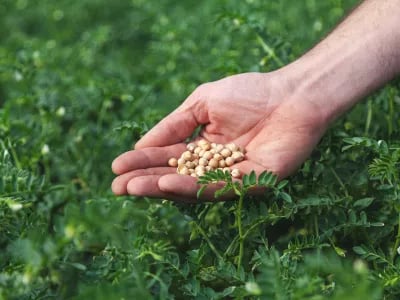After a successful initial test conducted in 2018, canned vegetable and legume producer HAK will start growing more chickpeas this year in the Zeelandic Flanders region of Zeeland province in the Netherlands. With the Giessen-based company seeking to source as many of its vegetables and legumes locally as possible, the purpose of this second crop trial is to further increase its knowledge base on the conditions under which the large-scale cultivation of chickpeas might be possible in the Netherlands. NPM Capital portfolio company HAK and its growers previously proved successful in 2017 and 2018 with crop trials for kidney beans in the Netherlands.
The initial ‘Dutch chickpea trial’ began in summer 2018 and turned out highly successful as a result of that year’s exceptionally hot and dry summer. The trial produced a yield of around 3,500 kilos per hectare, topping average crop yield by more than 15%. This outcome was encouraging enough for HAK, grower Pieter Risseeuw from the town of Schoondijke (Zeeland province) and legume and bean specialist Termont en Thomaes, which supervised the trial, to continue the experiment this year.
Risseeuw planted two hectares of chickpeas this year, a crop not native to the Netherlands. He is optimistic about the results, although it is too early to say at this point whether cultivation at a larger scale will be viable: “We are still at the learning stage, and aren’t quite sure yet how the crop will react to higher moisture levels or lower temperatures, variables to which chickpeas are highly sensitive. We are currently sowing a variety used by Canadian growers, but chickpea varieties from other countries could well produce better results, like during a wet Dutch summer, for example. We also made a number of discoveries during the first trial we would like to incorporate into this year’s trial.”
Young Zeelandic soil
HAK has been experimenting for a while with non-native, introduced bean varieties in the Zeelandic Flanders region. As HAK Director of Purchasing and Agriculture Adri den Dekker explains, the cultivation of red kidney beans has been quite successful. “As part of our ‘HAK’s Green Cuisine’ sustainability strategy, we grow our cops locally as much as possible. That’s why we are closely involved in experimenting with legume varieties grown on native Dutch soil for the first time.”
Director Ben Thomaes of Termont and Thomaes adds: “The Zeelandic Flanders region offers excellent conditions for this type of cultivation. We are blessed with highly fertile ‘young’ soil, which is just a few hundred years old. Also, the fact that we’re close to the sea means we’ve got moderate temperatures combined with abundant sunshine.”
According to Thomaes, Dutch consumers have really only discovered chickpeas in the last few years. His company, which is located in the town of Biervliet, saw its chickpea sales treble in just a few years’ time. Thomaes believes this can be credited in part to the trend of more people shifting toward more plant-based diets. With their high vegetable protein content, chickpeas are highly suited to a vegetarian or vegan lifestyle. Another explanation is the rapid rise in the popularity of Middle Eastern cuisines, in which chickpeas are a commonly used ingredient.
Also read: ‘Initial test results of chickpea cultivation in the Netherlands are surprisingly positive’



.jpg?width=448&height=200&name=cybersecurity-privacy-protect-data%20(1).jpg)









